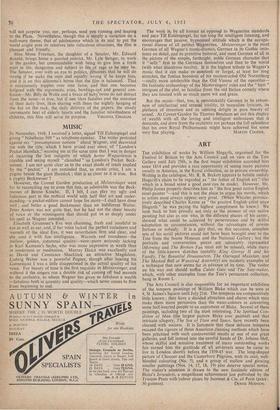MUSIC
IN November, 1948, I received'a letter, signed Till Eulenspiegel and giving " Nibelheim 999 " as telephone-number. The writer protested against my " presumptuous notions " about Wagner, and decorated me with the title, which I have prized ever since, of "London's Pocket Hanslick," warning me at the same time that I was in danger of incurring the last indignity of which homo Wagtzeriensis is capable and seeing myself " classified " as London's Pocket Beck- messer. I am not quite clear as to the exact shade of insult implied by the " pocket." I am reminded that, as music critic, I am a pygmy beside the giant Hanslick ; that is as clear as it is true. But a pygmy Beckmesser ?
However, the Covent Garden production of Meistersinger went far to reconciling me to even this fate, so admirable was the Beck- messer of Benno Kusche. If, I felt, I can play my ugly and ludicrous part in the musical world with half that art and under- standing—a pocket-edition cannot hope for more—I shall have done well ; and better a good Beckmesser than an indifferent Walter. Peter Anders was not quite that, but he had not the sheer beauty of voice or the winningness that should put us as deeply under his spell as Wagner intended. Elisabeth Grummer's Eva was charming, fresh and youthful to eye as well as ear, and, if her voice lacked the perfect roundness and warmth of the ideal Eva, it was nevertheless firm and clear, and she used it with fine intelligence. Warmth and roundness—the mellow, golden, autumnal quality—were more seriously lacking in Karl Kamann's Sachs, who was more impressive in wrath than in tenderness or meditation. Murray Dickit was excellently cast as David and Constance Shacklock an attractive Magdalene. Ludwig Weber was a powerful Pogner, though after hearing his Gurnemanz I was a little disappointed in the actual quality of his voice. For beauty of tone is the first requisite in Meistersinger, and without it the singers run a double risk of coming off• bad seconds to the orchestra, to whom Wagner has given so fabulous a wealth —fabtflous both in quantity and quality—which never ceases to flow from beginning to end.
The work is, by all human as opposefi to Wagnerian standards and pace Till Eulenspiegel, far too long fbr intelligent listening, and encourages that passive, hypnotised attitude which is the occupa- tional disease of all perfect Wagnerites. Meistersinger is the most German of all Wagner's music-dramas, German in its Gothic insis- tence on detail, and its primitive humour, and most German of all in the picture of the simple, forthright, noble German character that it " sells " first to the Germans themselves and then to the world (with what disastrous results). It is the highest tribute to Wagner's music that it can make us overlook or forget, at least for long stretches, the fustian boredom of his reconstructed Old Nuremberg —really more intolerable than the Old Vienna of the operettas— the fantastic archaeology of the Mastersingers' rules and the " ham " intrigues of the plot, so familiar from the old Italian comedy where they are treated with so much more wit and grace.
But the music—that, too, is unmistakably German in its robust- ness of intellectual and sensual vitality, its masculine lyricism, its plethora of invention and its untiring delight in pure beauty of sound. At Covent"Garden Sir Thomas Beecham set out this display of wealth with all the loving and intelligent enthusiasm that it demands, and drew from the orchestra not perhaps the full splendour that his own Royal Philharmonic might have achieved but some






















































 Previous page
Previous page